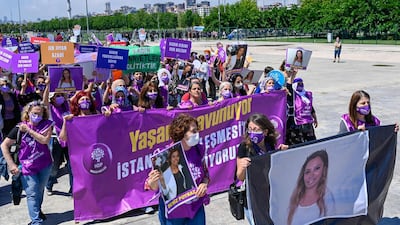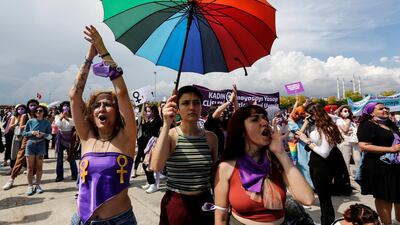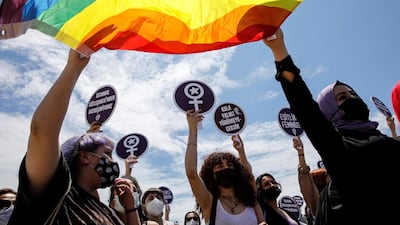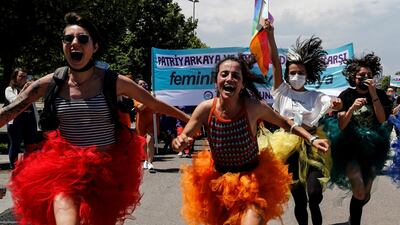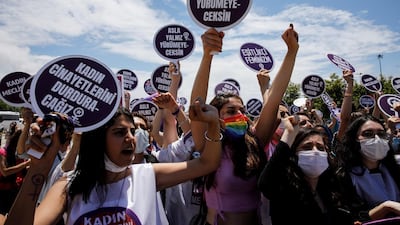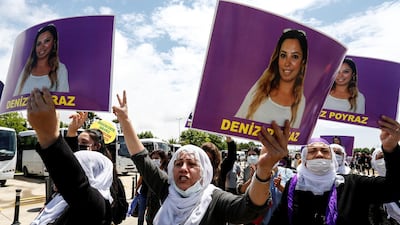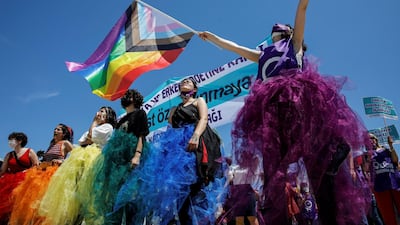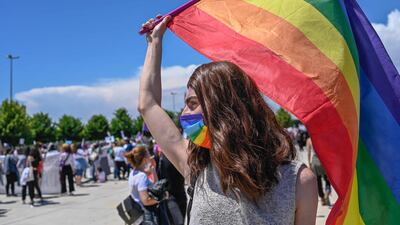Thousands of protesters from across Turkey travelled to Istanbul on Saturday to march against the country's withdrawal from the Istanbul Convention, amid a rise in gender-based violence and continued erosion of women's rights.
On March 20, President Recep Tayyip Erdogan issued a midnight decree that annulled Turkey's ratification of the convention, legislation designed to protect women and signed by 45 countries and the EU in 2011. The country is due to withdraw officially on July 1.
Holding signs that read "masculinity is more deadly than coronavirus" and "real men are feminists", protesters of all ages braved the strong summer sun in the city's Maltepe district to demand a reversal of the decision before the deadline.
"In the middle of the night, Turkey was removed from the Istanbul Convention due to the decision of just one person. We are here to change this. We are here to say that we are not giving up and we will re-enter the convention," said Melek Onder, 32, from We Will Stop Femicides, which organised the event.
“We stand against the lawless and unconstitutional acts on women that happen regularly in Turkey. Every day women are being killed. Every day we are against the unfairness.”
Activists and lawyers claim the decree is incompatible with constitutional law and around 130 groups joined the demonstration. Small marches have taken place regularly since the announcement, but the recent normalisation of Covid restrictions now allows mass gatherings.
Turkey's decision to withdraw from the Istanbul Convention has been highly criticised by the EU and human rights advocates.
However, according to the communications directorate, the treaty had been “manipulated” and is “incompatible with Turkey's social and familial values”.
Ankara has been accused of backsliding on women's rights in recent years. Hundreds of women are killed by men annually, with a further increase in domestic violence owing to the pandemic.
Over the past five years, the number of femicides has doubled and in May alone, there were 17 cases of femicide reported, as well as 20 suspicious deaths.
Inadequate protection
In 2018, the government launched an app to report domestic abuse and it has been downloaded by almost two million women, with more than 100,000 incidents recorded so far. Yet critics say the government failed to introduce measures to protect women from increased violence owing to the pressures of Covid-19 and staying at home.
In the first three months of restrictions last year, the We Will Stop Femicides helpline received 55 per cent more calls for support. The activist group raises awareness about gender-based issues, as well as providing legal assistance to abused women or the relatives of those who have been murdered.
A "black and white selfie" campaign thought to have been started in Turkey drew attention to femicide in 2020, with millions of women, including Hollywood celebrities such as Jessica Biel and Demi Moore, joining the social media trend.
As protesters marched holding placards remembering the murdered on Saturday, a new face featured heavily – that of Deniz Poyraz, 38, who was shot on Thursday in the western city of Izmir at the regional office of the pro-minority Peoples' Democratic Party (HDP).
Poyraz had been standing in for her sick mother working as a cleaner when a former health worker entered and opened fire. HDP representatives claim police had been stationed outside the office at the time of the attack.
Ayse Acar Basaran, 35, a spokewoman for the HDP women's assembly who travelled from the south-eastern city of Batman to protest, said the attack showed the potential consequences of fiery rhetoric from the government against women and minorities.
“Every day in Turkey women are killed and we can’t even count how many,” she said.
“We know that resisting is the right thing to do and if we don’t things will get worse.”
Ankara has moved to close down the HDP, a vocal supporter of rights for women, as well as minorities, in recent months, accusing it of links to the Kurdistan Workers’ Party (PKK), considered a terrorist organisation by Turkey, the EU and US. The HDP denies the claims.
Men also showed up to the event to show solidarity for women and the difficulties they face.
Mahmout Yildiz, 64, is not personally affected by the Istanbul Convention withdrawal but he said he travelled across the city on board a bus organised by one of the feminist groups to show his support.
“I am here to resist,” he said. “Women are not alone.”
